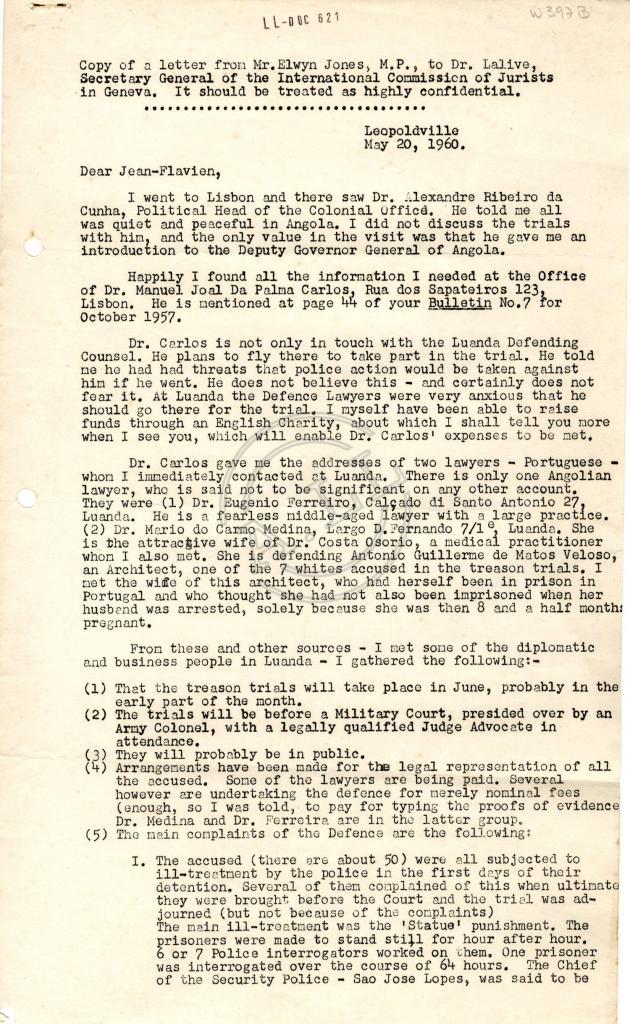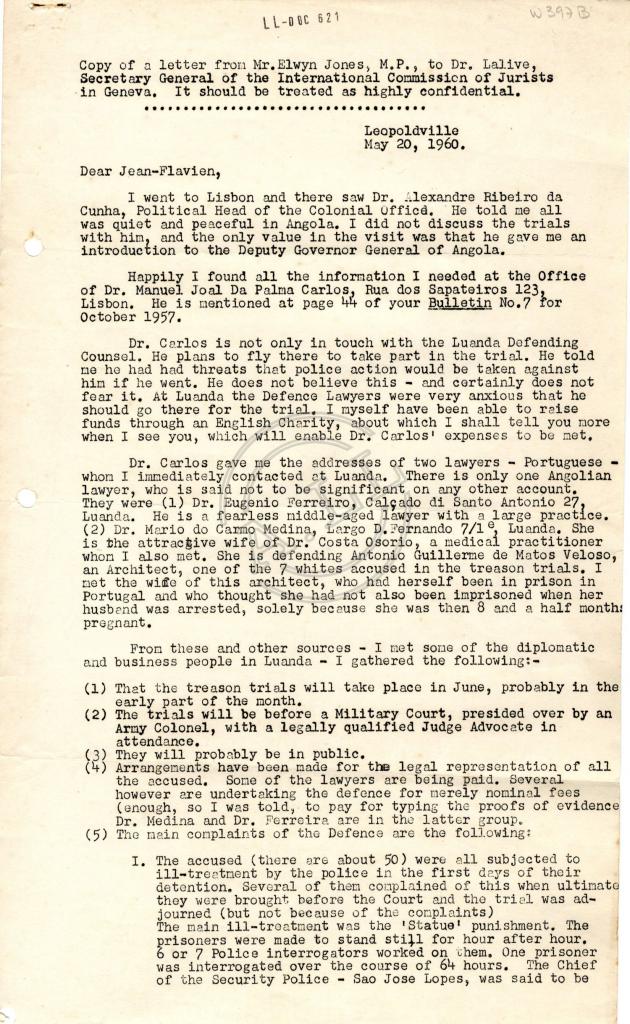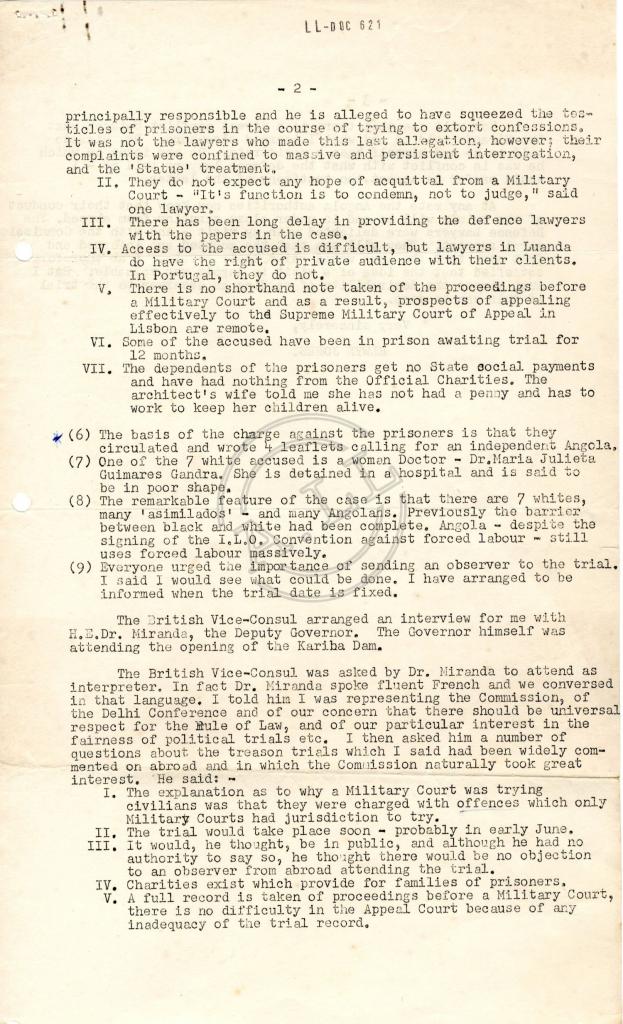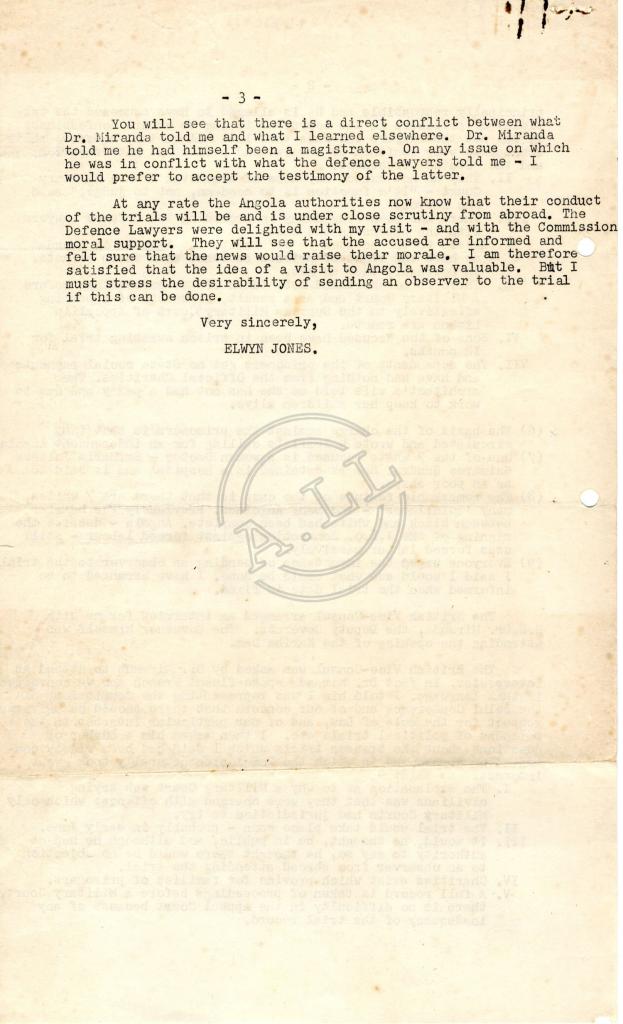Copy of a letter from Mr. Elwyn Jones, M.P., to Dr. Lalive, Secretary General of the International Commission of Jurists in Geneva. It should be treated as highly confidential.
Leopoldville
May 20, 1960.
Dear Jean-Flavien,
I went to Lisbon and there saw Dr. Alexandre Ribeiro da Cunha, Political Head of Colonial Office. He told me all was quiet and peaceful in Angola. I did not discuss the trials with him, and the only value in the visit was that he gave me an introduction to the Deputy Governor General of Angola.
Happily I found all the information I needed at the Office of Dr. Manuel Joal Da Palma Carlos, Rua dos Sapateiros 123, Lisbon. He is mentioned at page 44 of your Bulletin No.7 for October 1957.
Dr. Carlos is not only in touch with the Luanda Defending Counsel. He plans to fly there to take part in the trial. He told me he had threats that police action would be taken against him if he went. He does not believe this - and certainly does not fear it. At Luanda the Defence Lawyers were very anxious that he should go there for the trial. I myself have been able to raise funds through and English Charity, about which I shall tell you more when I see you, which will enable Dr. Carlos’ expenses to be met.
Dr. Carlos gave me the address of two lawyers - Portuguese - whom I immediately contacted at Luanda. These is only one Angolan lawyer, who said not to be significant on any other account. They were (1) Dr. Eugenio Ferreira, Calçado di Santo Antonio 27, Luanda. He is a fearless middle-aged lawyer with a large practice. (2) Dr. Maria do Carmo Medina, Largo D. Fernando 7/1, Luanda. She is the attractive wife of Dr. Costa Osorio, a medical practitioner whom I also met. She is defending Antonio Guillerme de Matos Veloso, an Architect, one of the 7 whites accused in the treason trials. I met the wife of this architect, who had herself been in prison in Portugal and who thought she had had not also been imprisoned when her husband was arrested, solely because she was then 8 and a half months pregnant.
From these and other sources - I met some of the diplomatic and business people in Luanda - I gathered the following:-
(1) That the treason trials will take place in June, probably in the early part of the month.
(2) The trials will be before a Military Court, presided over by an Army Colonel, with a legally qualified Judge Advocate in attendance.
(3) They will probably be in public.
(4) Arrangements have been made for the legal representation of all the accused. Some of the lawyers are being paid. Several however are undertaking the defence fro merely nominal fees (enough, so i was told, to pay for typing the proofs of evidence Dr. Medina and Dr. Ferreira are in the latter group.
(5) The main complaints of the Defence are the following:
I. The accused (there are about 50) were all subjected to ill-treatment by the police in the first days of their detention. Several of them complained of this when ultimately, they were brought before the Court and the trial was adjourned (but not because of the complaints) The main ill-treatment was the ‘Statues’ punishment. The prisoners were made to stand still for hour after hour. 6 or 7 Police interrogators worked on them. One prisoner was interrogated over the course of 64 hours. The Chief of the Security Police - Sao Jose Lopes, was said to be principally responsible and he is alleged to have squeezed the testicles of prisoners in the course of trying to extort confessions. It was not the lawyers who made this last allegation, however; their complaints were confined to massive and persistent interrogation, and the ‘Statue’ treatment.
II. They do not expect any hope of acquittal from a Military Court - “It’s function is to condemn, not judge,” said one lawyer.
III. There has been long delay in providing the defence lawyers with the papers in the case.
IV. Access to the accused is difficult, but lawyers in Luanda to have the right of private audience with their clients. In Portugal, they do not.
V. There is no shorthand note taken of the proceedings before a Military Court and as a result, prospects of appealing effectively to the supreme Military Court of Appeal in Lisbon are remote.
VI. Some of the accused have been in prison awaiting trial for 12 months.
VII. The dependents of the prisoners get no State social payment and have had nothing from the Official Charities. The architect’s wife told me she has not had a penny and has to work to keep her children alive.
(6) The basis of the charge against the prisoners is that they circulated and wrote 4 leaflets calling for an independent Angola.
(7) One of the 7 white accused is a woman Doctor - Dr. Maria Julieta Guimares Gandra. She is detained in a hospital and is said to be in poor shape.
(8) The remarkable feature of the case is that there are 3 whites, many ‘assimilados’ - and many Angolans. Previously the barrier between black and white had been complete. Angola - despite the signing of the I.L.O Convention against forced labour - still uses forced labour massively.
(9) Everyone urged the importance of sending an observer to the trial. I said I would see what could be done. I have arranged to be informed when the trial date is fixed.
The British Vice-Consul arranged an interview for me with H.E. Dr. Miranda, the Deputy Governor. The Governor himself was attending the opening of the Kariba Dam.
The British Vice-Consul was asked by Dr. Miranda to attend as interpreter. In fact Dr. Miranda spoke fluent French as we conversed in that language. I told him I was representing the Commission, of the Delhi Conference and of our concern that there should be universal respect for the Rule of Law, and our particular interest in the fairness of political trials etc. I then asked him a number of questions about the treason trials which I said had been widely commented on abroad and in which the Commission naturally took great interest. He said:-
I. The explanation as t why a Military Court was trying civilians was that they were charged with offenses which only Military Courts had jurisdiction to try.
II. The trial would take place soon - probably in early June.
III. It would, he thought, be in public, and although he had no authority to say so, he thought there would be no objection to an observer from abroad attending the trial.
IV. Charities exist which provide for families of prisoners.
V. A full record is taken of proceedings before a Military Court, there is no difficulty in the Appeal Court because of any inadequacy of the trial record.
You will see that there is a direct conflict between what Dr. Miranda told me and what I learned elsewhere. Dr. Miranda told me he had himself been a magistrate. On any issue on which he was in conflict with what the defence lawyers told me - I would prefer to accept the testimony of the latter.
At any rate the Angola authorities now know that their conduct of the trials will be and is under close scrutiny from abroad. The Defence Lawyers were delighted with my visit - and with the Commission’s moral support. They will see that the accused are informed and felt sure that the news would raise their morale. I am therefore satisfied that the idea of a visit to Angola was valuable. But I must stress that the desirability of sending an observer to the trial if this can be done.
Very sincerely,
ELWYN JONES.
Cópia duma carta de Elwyn Jones ao Dr. Lalive, Secretário-geral da Comissão Internacional de Juristas em Genebra. «Altamente Confidencial». Carta sobre contactos efectuados em Lisboa e em Luanda com advogados. Fala de Eugénio Ferreira e de Maria do Carmo Medina e sobre o Processo dos 50. (Léopoldville). (Copy of a letter from Mr. Elwyn Jones, M.P., to Dr. Lalive, Secretary General of the International Commission of Jurists in Geneva).



